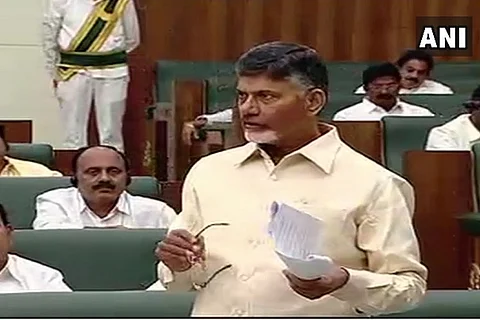

The Andhra Pradesh assembly on Saturday unanimously passed a legislation to provide five per cent reservation for the Kapu community in government jobs and educational institutions.
Meeting a long-pending demand of Kapus, the government has included the community in the backward classes by creating a separate category 'F'.
In the absence of only opposition party YSR Congress, which is boycotting the session, leaders of ruling Telugu Desam Party (TDP) and its coalition partner Bharatiya Janata Party (BJP) participated in the debate on the bill.
Minister for Backward Classes Welfare K AtchanNaidu tabled the bill. Chief Minister N Chandrababu Naidu and other members spoke on the bill. It was later passed unanimously with a voice vote.
After the bill was passed, Chief Minister N Chandrababu Naidu exchanged sweets with Ministers from the Kapu community in his cabinet.
“As 5% of reservation to Kapus makes total reservation exceed 50%, central govt nod is compulsory. We will send this bill to the centre. We ask them to include this reservation in schedule 9, so that it will become legitimate,” Naidu was quoted as saying.
This came a day after the Andhra Pradesh cabinet recommended 5% reservation for the Kapu community, without impacting other BC communities and their reservation quota.
Reservation in Andhra
The cabinet took the decision after discussing the report submitted by the three-member Manjunatha Commission constituted for the purpose.
A new, BC-F category was created for this purpose, where sub-castes Ontari, Telaga and Balija were also added.
According to reports, BCs get 29% reservation under A,B,C,D and E categories, while 15% and 6% reservations exist for Scheduled Castes (SCs) and Scheduled Tribes (STs), respectively.
With another 5% being added in the BC-F category, the total reservation in the state will now go up to 55%.
History
The Kapu community with a significant population in the twin Godavari districts, plays a key role in deciding a party's chances in any election.
Granting them reservation, was one of Naidu's key poll promises, which he made while addressing a massive Praja Garjana rally in West Godavari.
He also promised that he would appoint a commission to work out modalities for implementing his promise.
In January 2016, during a Kapu 'Garjana Mahasabha' held in East Godavari district, political leader Mudragada Padmanabham allegedly riled up the crowd, following which the crowd went on a rampage.
Protesters set fire to eight bogies of the Ratnachal Express at Tuni, before they went on to damage a police station, and police and private vehicles.
Following the incident at Tuni, the TDP government constituted the Manjunatha Commission to look into the reservation issue.
Angered by the delay in the Commission's report, Kapu leaders had earlier planned the 400-km 'padayatra' that would cover the districts of East Godavari, West Godavari, Krishna and Guntur, before ending at Amaravati.
However, they called it off after multiple attempts to undertake the walkathon, were foiled by the police.
Reservation in India
Tamil Nadu is the only state in India which has over 50% reservations in educational institutions, despite a Supreme Court order in 1992.
In 1994, the TN government got the Centre to amend Schedule 9 of the Constitution. Schedule 9 is a list of laws that state governments have brought in, that are exempt from any judicial review - which means that Tamil Nadu’s 69% quota for backward classes cannot be challenged by anyone in any court of law in India.
At present, Telangana Chief Minister K Chandrasekhar Rao also wants to amend Schedule 9 in order to increase the Muslim quota to 12% in his state.
However, unlike KCR, Naidu has an ally in the Centre, as the TDP is part of the NDA government.